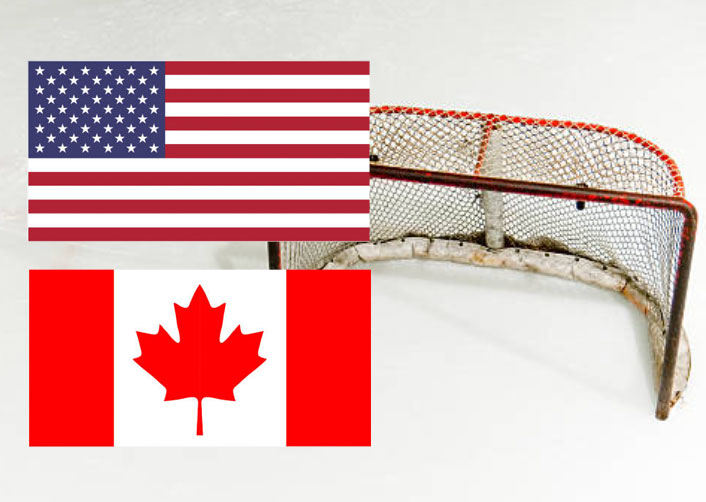Players Should Beware of These Challenges
Given the greater number of NHL teams in the United States versus Canada, it’s common for Canadian professional hockey players to ultimately live and play in the U.S. But in doing this, players will need specialized cross-border financial advice, including on immigration, tax, estate and investment planning.

There are a lot of moving parts when it comes to planning for professional athletes from a Canada/U.S. perspective. As a result, we’ve often found ourselves cleaning up the debris caused by ignorance, inexperience and uncoordinated planning. You’d like to think that players of this calibre and income level would have the best advisors available. However, that’s not always the case. Here are a few areas of particular concern.
U.S. immigration issues
To live and play in the U.S., a player will need legal immigration status. This can be obtained through a U.S. work visa or Green Card or by attaining naturalized U.S. citizenship. The most common types of U.S. visas for athletes include the O-1, P-1, H-2B and B-1 visas. Each has certain requirements and length terms. In some cases, these visas can be extended, or an athlete can apply for permanent residence through a U.S. Green Card.
We were involved with one athlete who had a P-1 visa expiring at the end of his season, when he’d become a free agent. Upon expiry, he’d have to return to Canada, where he hadn’t lived for about four years. He would then have to apply for new U.S. immigration status and return to the U.S. in hopes of getting his contract renewed. Also, his state driver’s license would automatically expire when his visa did, so he would not be legally able to drive.
Before the season ended, we worked with a U.S. immigration attorney so the player could get a U.S. Green Card. But while that application was being processed—it usually takes at least three months—he couldn’t leave the U.S. unless he received a specific travel document (USCIS Form I-131).
This posed a number of problems. He could not return to Canada in the off-season; he could not legally drive his vehicle in the state he lived in, and he needed to have his travel document issued before the team’s first game, which was in Canada. Fortunately, working with and coordinating with U.S. immigration counsel, the I-131 was issued before his first game, and he ultimately received his Green Card.
The player is now able to live and work in the U.S., including after his playing career. After holding his Green Card for five years, he can then apply for U.S. citizenship through naturalization and become a dual citizen of Canada and the U.S.
Expatriation
There are tax consequences if a European or Canadian player chooses to leave the U.S. and return to his home country. The main one is the dreaded U.S. Expatriation Tax under provisions 877 and 877A in the Internal Revenue Code. If a player has a U.S. Green Card for eight years—and in some cases as few as six years—he’d be defined as a long-term resident. And if he chooses to give up or abandon or surrender the card in a situation where his worldwide net worth exceeds US$2 million on the date of expatriation or termination of residency, he could face a hefty income tax bill when he leaves the U.S.
So, it’s critical that players understand the implications of the expatriation rules, not only from an income tax perspective but from a lifestyle perspective as well. We often find that many U.S. immigration attorneys do not discuss these issues for those athletes who become U.S. residents/citizens while playing in the U.S.
U.S. income tax and investment issues
We often see situations where advisors try to skirt compliance or Canada Revenue Agency (CRA) rules.
Advisors will often suggest players keep a Canadian address on an account even though they’re living in the U.S. In some cases, we have seen advisors suggest using segregated funds or Canadian-based life insurance products as a means to circumvent certain rules. Both strategies cause problems for the player and potentially the advisor as well. But with the implementation of the Foreign Tax Compliance Act (FATCA), doing either has become much harder.
We were involved in a file a few years back where a high-profile player was traded from a Canadian team to a U.S. team. He had previously been advised to sever his Canadian tax ties and to exclusively become a U.S. income tax resident. The advisor was not licensed in the U.S. and transferred the majority of the player’s nonregistered assets into new segregated funds and Canadian mutual funds. He also changed the address on the accounts to a family member’s address in Canada.
On top of the serious securities compliance violations, this created a number of adverse Canadian and U.S. income tax problems. The player’s Canadian tax experts had filed an Exit Return for him for the tax year in which he was traded. As a nonresident of Canada for tax purposes, the accounts should have nonresident treaty withholding taxes imposed on Canadian-source investment income, and the player should have received CRA NR4 slips. Instead, the slips issued were CRA T3 and T5 slips, which contradicted the Canadian tax residency position filed by his accountants. Further, from a U.S. income tax position, all of his holdings were considered to be Passive Foreign Investment Companies (PFICs), further creating onerous U.S. income tax results.
We’ve also seen Canadian advisors who have U.S.-based players and don’t understand the rules. For example, we still see too few attempts to look beyond Canadian securities in portfolio construction, in spite of the fact that maintaining core holdings in Canadian dollars might not make sense for most players living and playing in the U.S.
And few advisors understand the implications and treatment of short- and long-term capital gains or losses from a U.S. tax perspective. This can create adverse U.S. tax consequences, given the higher U.S. marginal rates and the 3.8% Net Investment Income Surtax on investment income.
These capital gains also create tax preparation headaches, as some Canadian custodians cannot report or track cost basis and transactions in U.S. dollars. For a player in a high-tax state like California or New York, the use of tax-free municipal bonds could make sense as a fixed-income proxy. However, most advisors in Canada are not aware of such vehicles or don’t have the ability to acquire them.
Maintaining RRSPs, TFSAs, segregated funds and other Canadian-domiciled accounts create additional U.S. tax compliance issues and could require filing IRS Forms 8938, 8621, 3520, 3520-A and FINCen114.
Estate planning issues
Players who live and work in the U.S. are likely considered domiciled there for estate and gift tax purposes. If a player marries a U.S. citizen, has children in the U.S., or has non-U.S. beneficiaries (parents or siblings back in Canada), planning is critical.
U.S. estate tax could be imposed at a player’s death if his worldwide estate exceeded US$12.92 million in 2023. Most advisors might think worldwide estate doesn’t include personal and financial assets. However, life insurance proceeds where a player has “incidents of ownership” is also part of a player’s worldwide estate. This includes: the power to change a beneficiary, surrender or cancel the policy, assign the policy, revoke an assignment, pledge the policy for a loan or obtain a loan against the surrender of the value of the policy from the insurer.
Some Canadian players have life insurance policies sold to them as a supplemental retirement program. The policies are often overfunded and have large death benefits. Given that one of the primary objectives of the policies is for the utilization of the future cash value, the policies are usually included in the worldwide estate of the player for U.S. estate tax purposes. This causes the proceeds to be subject to as much as 40% in U.S. estate taxes.
Depending on the specifics of the policy, it might be considered a Modified Endowment Contract under U.S. tax rules, subject to alternative U.S. income tax results upon distribution and death. If Canadian insurance companies issue the policies, a U.S. Excise Tax of 1% of the premium must be paid.
Also, estate planning documents including wills, powers of attorneys and health directives (known as living wills) in the U.S. will need to be drafted to meet a player’s specific financial and family objectives.
U.S. inter vivos (family) trusts are fairly common for wealthy individuals. Eliminating probate on assets is a common objective of these trusts, which are transparent for U.S. income, gift and estate tax purposes. We worked with one player who spent more than $40,000 on his U.S. estate plan, which included a family trust. The problem was he had all his financial assets with an advisor and firm located in Canada. Because the assets were held with a Canadian custodian and advisor, he could not settle these assets into his U.S. trust. This defeats one of the primary objectives of setting up the trust in the first place.
The U.S. estate attorney did not realize the player’s Canadian assets could not be settled in the trust, and his Canadian advisor did not want to lose the assets. Therefore, although the player spent a significant amount of money for the estate plan, the planning objectives would not have been achieved without a bit more time and cost if he had passed away.
The above are just a few of the many issues that we have seen over the years. There are countless others that could be shared. With the financial, immigration, income, gift and estate tax and planning environments constantly changing, it is important that the planning that you require is done on a comprehensive basis.
The Advisors at Cardinal Point Sports Management are recognized experts in cross-border planning matters. This expertise allows us to provide true comprehensive wealth management solutions that meet a player’s specific and unique needs.

